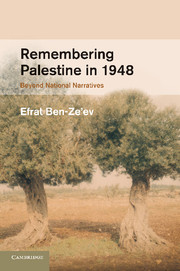Book contents
- Frontmatter
- Contents
- List of illustrations
- Maps
- Preface
- Map of Palestine prior to 1948
- Introduction
- Part I Constructing Palestine: National Projects
- Part II Palestinian-Arab Memories in the Making
- Part III Jewish-Israeli Memories in the Making
- 7 Palmach Fighters
- 8 The Palmach Women
- Part IV British Mandatory Memories in the Making
- Conclusions and Implications
- Bibliography
- Notes
- Index
- Studies in the Social and Cultural History of Modern Warfare
7 - Palmach Fighters
Stories and Silences
Published online by Cambridge University Press: 07 October 2011
- Frontmatter
- Contents
- List of illustrations
- Maps
- Preface
- Map of Palestine prior to 1948
- Introduction
- Part I Constructing Palestine: National Projects
- Part II Palestinian-Arab Memories in the Making
- Part III Jewish-Israeli Memories in the Making
- 7 Palmach Fighters
- 8 The Palmach Women
- Part IV British Mandatory Memories in the Making
- Conclusions and Implications
- Bibliography
- Notes
- Index
- Studies in the Social and Cultural History of Modern Warfare
Summary
Israel's narrative of its foundational war, 1948, was inevitably mythologized. The mythologization of war, Samuel Hynes wrote, is neither a fabrication nor the creation of fiction. Rather, it is the simplification of a narrative, turning it into something imaginable and manageable (1997:xiii). Mythologized war is often reduced to being merely good or bad, a success or failure. In contrast, the narratives of war that are told by the participating soldiers, mostly not in public contexts, are anything but single-stranded myths. They are often chaotic, lacking chronology or a wider context. They are scattered reminiscences. There is a necessary gap between personal war recollections and official historiography. Because official historiographies are prevalent and only partial, to get a fuller picture of war we must seek personal accounts. “If we would understand what war is like, and how it feels,” wrote Hynes, in The Soldiers' Tale, “we must turn away from history and its numbers, and seek the reality in the personal witness of the men who were there” (1997:xii). Following Hynes, who wrote of other places and settings, this chapter explores how the 1948 war felt for the Palmach soldiers who survived it. However, while Hynes's title suggests that the soldiers' narratives, placed together, form a single tale, this chapter seeks the multiplicity of war narratives.
Furthermore, while Hynes was interested in all aspects of the soldiers' war experience, the emphasis here is on the “untold”; on what was perceived as causing uneasiness and discomfort.
- Type
- Chapter
- Information
- Remembering Palestine in 1948Beyond National Narratives, pp. 127 - 145Publisher: Cambridge University PressPrint publication year: 2011

